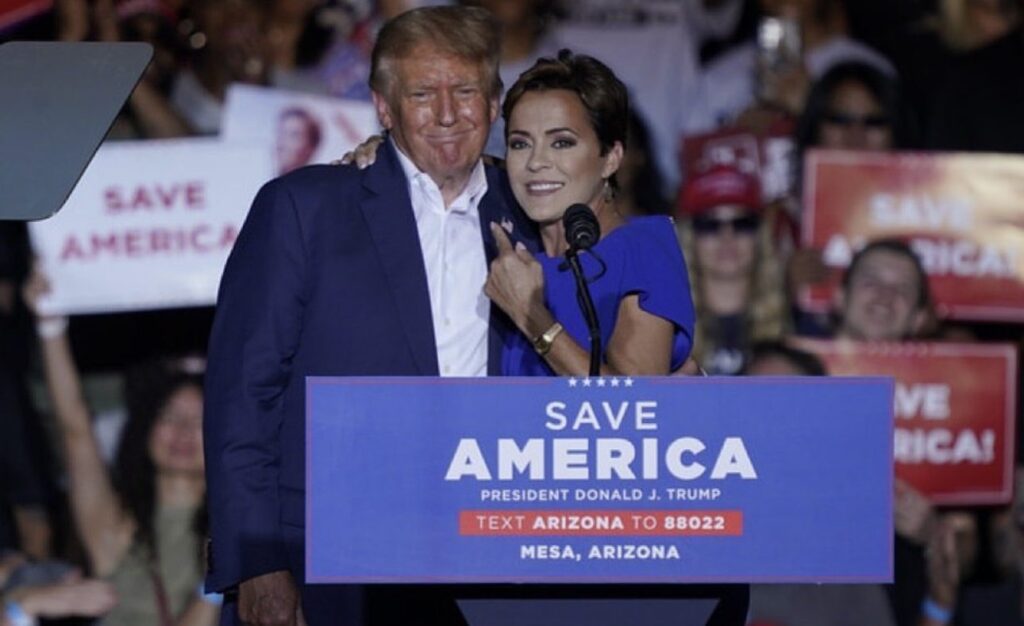Former President Donald Trump announced that Kari Lake, a close ally and veteran broadcast news anchor, will be the new Director of the Voice of America (VOA). Lake, known for her staunch support of Trump and criticism of what she perceives as misinformation around the COVID-19 pandemic and the 2020 election, resigned her position as a nightly news anchor to protest these issues. Her appointment has stirred up reactions, particularly among her critics in mainstream media, who view her as a controversial figure. The announcement comes after her contentious campaign for the Senate in Arizona, where allegations of electoral anomalies have fueled claims about election integrity, particularly in Maricopa County, where she and Trump alleged that improper vote counting affected her results.
In her role, Lake is expected to lead the VOA, which serves as an international multimedia broadcasting service funded by the U.S. government. Under her direction, the organization aims to counter what Lake and her supporters label as anti-American and Marxist propaganda, echoing its historical roots during World War II as a counter to Nazi propaganda. Trump emphasized that Lake’s leadership will ensure that American values of freedom and liberty are communicated honestly and effectively worldwide, contrasting this approach with the inaccuracies he claims are perpetuated by the mainstream media.
Lake has consistently fought against the narratives surrounding the alleged rigging of the 2020 and 2022 elections, where she argues that systemic failures and biases in the electoral process, particularly handled by officials like Maricopa County election head Stephen Richer, undermined her campaigns. These events and subsequent legal battles over her claims have solidified her stature among Trump’s supporters, who see her as a champion of conservative electoral integrity. Critics, especially from the Democratic Party and opposing media outlets, argue that Lake’s claims lack sufficient evidence and paint a picture of unsubstantiated accusations against election officials.
Following the announcement, Lake expressed her gratitude towards Trump, stating that she is honored to lead an agency that focuses on promoting democracy, truth, and American achievements on a global scale. With the VOA serving an estimated audience of over 354 million in almost 50 languages, she heralds a mission focused on outreach and communication that aligns with the America First agenda championed by Trump and his allies. Her enthusiastic commitment to the position signals a shift in the agency’s approach, which many stakeholders anticipate will reflect a more conservative viewpoint under Lake’s guidance.
Reactions from fellow Republican officials and supporters were largely positive, with many praising Lake’s media expertise and commitment to broadcasting a message that aligns with Trump’s presidency. Arizona Congressman-elect Abraham Hamadeh stressed that Lake would effectively convey the America First ideals to a vast international audience, while State Senator Jake Hoffman highlighted her qualifications as a fearless spokesperson for American freedoms. Their remarks underline a broader expectation from Lake’s base that her leadership will invigorate conservative messaging in international broadcasting and counterbalance liberal narratives.
Overall, Kari Lake’s appointment as Director of the Voice of America reflects a broader trend within certain factions of American politics, particularly the Republican Party, to reclaim narratives and media platforms from perceived liberal bias. As the agency prepares for a new direction under Lake, the implications of her leadership will be observed closely, with supporters eager to see how her background in broadcasting and her ideological stance will reshape the agency’s voice on the world stage. Critics, on the other hand, will likely continue to scrutinize her approach and the decisions made during her tenure at VOA, keeping the spotlight on the contentious intersection of media, politics, and public policy in the United States.

